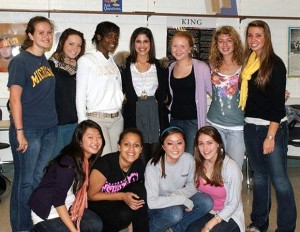• Student peacemaking group expands to 4 more schools
By Carlina Duan
AAPSNews Service
It’s third hour at Pioneer High School, and two classrooms are abuzz with compassionate students in discussions laden with the burdens and reflections of one another.
Although their ages, backgrounds, ethnicities, and social groups are diverse, they all share one thing in common: they are members of PPI, Pioneer High School’s Positive Peer Influence group, which helps other students with challenges in and out of school that may interfere with their academic achievement.

“PPI members are here to try to evoke motivation without making changes,” explained school psychologist Kristine Wisner, the Women’s PPI Group Leader. We’re not here necessarily to give direction, or give advice; because we’re not a therapy group. The premise is that students are more likely to talk to their peers.”
Founded in 1988, the three-semester elective class at Pioneer trains students with exceptional communications skills to help other students who may be struggling with any type of problem. Students are referred to PPI by administrators or friends and are given one hour to discuss their challenges with PPI members.
On average, the PPI group receives about three to four referrals each week.
The organization is divided into two groups by gender, each group containing about 10 to 12 student members. School social worker Jonathan Stern, the Men’s PPI Leader, explains the target behind the gender division, saying: “PPI is separated by gender to create an ‘audience effect’. You’re in a room with 12 other people and you just have to be yourself. For guys, that’s an unusual thing.”
Both groups both meet during third hour each day, where they can be found assisting other students with obstacles, or learning more about the self-help group process.
“(Members) in PPI will reflect around their own experiences, and help give resources for people suffering from mental health issues, academic stress, family problems, substance abuse, anything,” Wisner said.
PPI is guided by confidentiality, and information shared does not leave the group. “Confidentiality is the foundation of PPI – it won’t work if it doesn’t have confidentiality,” she added.
PPI member junior Ally Daniels agrees, calling PPI “a comfortable setting where you can talk without fear of things being leaked. It’s a place to vent, and it’s a place where people can breathe,” she said. “You can talk about whatever you want without being judged.”
It’s a place to vent, and it’s a place where people can breathe. You can talk about whatever you want without being judged.” – Junior and PPI member Ally Daniels
Junior Emily Lim is also a PPI member. “We don’t try to give advice,” she added. “We try to boost [a referral’s] confidence, and let them think of ways to help solve their own anger.”
New PPI members are chosen by other members of the group, who select their peers based on the diversity of social groups that they belong to and their level of social skill. Potential members must undergo an interview process, whereupon the entire group then decides whether or not a peer has met qualifications of diversity and communication.
The purpose of this diversity is for a referred student who may feel a stronger connection speaking to a peer of his or her own social group or ethnicity.
“We’re a group of different social and ethnic backgrounds,” added junior Adam DesJardins, a PPI member. “There’s definitely going to be someone in our group that you’re bound to identify with.”
Wisner said communication is key when selecting PPI members, “PPI is a function where we have kids that fit any social facet in the building,” she said. “We pick people that have good communication skills, and that are well integrated within their own social groups. We don’t want all our kids to be perfect – they have to have their own struggles that they’ve faced and overcome.”
Yet the PPI members should have with them other skills as well. Stern said, “Empathy is really important. Communication skills are also important – they need to have active listening, and be reflective.”
New PPI members undergo an orientation to further develop these skills. Stern explained, “When PPI members first come in, we orient them towards understanding why people are the way they are. For the first semester, we (get a) set way of things going. They start to figure it out,” he said. “Second semester – it’s full-blown going. And by third semester, they’ve become leaders.”
PPI members also experience a group activity called “Lifers,” where members “tell their own story, their own struggles, values, paths that they’ve walked to the rest of the group,” Wisner said. “The most important part of this is that they now know what it’s like to feel vulnerable.”
PPI members must commit to three semesters of class, leaving with an understanding of resolving differences, creating goals, and conflict management. “By the end of third semester, students walk away with the fact that you can’t judge people. And they’re humbled by this,” Wisner added.
Stern said PPI has been a proven program at Pioneer. “What I like most is that it’s been a consistent thread for 23 years now – and it’s able to maintain itself,” he said. “Values continue because members hold these values close to their [hearts], and translate these values to the next year.”
Wisner said the program is invaluable. “In PPI, they do really great things quietly,” she said. “They’re not doing it for recognition.”
Carlina Duan is the News Editor for The Optimist, Pioneer High School’s student newspaper. She also reports and writes for the AAPSNews Service.

